8 – Old George, Gibbo, and the Evils of Drink
Old George lived like a recluse in the back room, emerging only on rare occasions. He guarded his territory doggedly, and no one was ever allowed to enter his room, except Mr Sussex, to whom he could complain at length about those musicians. Not that the music ever bothered him; he was fairly deaf.
The highlight of Old George’s life was pension day. He would go off to the Post Office, pick up his pension, then up the road to the Rising Sun on K Road to fill his wicker basket with flagons of cheap sherry, each wrapped in the obligatory brown paper bag. Laying in stocks of food was a rarity for Old George, but the plonk was the staff of life. After he had taken special care negotiating the steep path down to the house (he had once stumbled and allowed a flagon to escape and roll down the hill to smash against the brick wall: a tragedy he never tired of morosely recalling), he would freely imbibe in his room for days, until the loud cries and moaning through the walls were a sure sign that devils and pink elephants were running around the walls and relentlessly chasing him. When the grog cut out, and the pension dried up, Old George gradually returned to his taciturn self, waiting impatiently till next pension day.
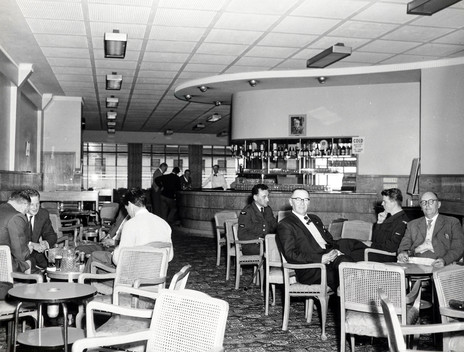
Upstairs at the Rising Sun Hotel, K Road, Auckland, 1959. - Auckland Libraries Heritage Collections 895-A59703
Old George had an occasional drinking companion for some time. In the old brick outbuilding alongside the house lived Gibbo, who was also an avid consumer of plonk. Gibbo had a grudge against all of mankind, not merely musicians, and in his cups would emerge from his brick hovel to shout and swear at anyone he pleased, even Mr Sussex, to whom the challenge of saving Gibbo’s soul was an almost unattainable goal.
Gibbo had more than a foul temper. When his plonk ran out, he switched to his ample stock of methylated spirits. After a session on the meths, his performance was awesome, and even Old George wouldn’t go near him. One night Gibbo excelled himself – his door crashed back on its hinges, and he staggered out shouting abuse at the top of his voice, wielding an axe and promising to chop up everyone he could reach. The residents barricaded themselves in their rooms and Mr Sussex had another crisis to resolve. He decided that salvation was not an option, and Gibbo was taken away, not to be seen at 57a again – he died soon after. Nothing of him remained except the axe marks in the brickwork of the house.
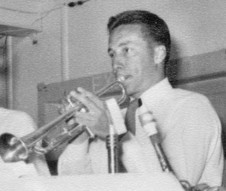
Lyn Christie, trumpet and bass player, 1950s - Merv Thomas Collection
Old George was quite civil by comparison, but there was one musician he hated. At some former time while he was living at 57a, Lyn Christie, a notorious bass player whose exploits warrant a book on their own, had played a joke on Old George as he did on many people, then promptly forgot about it. But Old George never forgot, and vowed to one day get even. His chance came one day shortly after pension day, when Lyn had come down to 57a to visit on his way to a gig with Pem Sheppard. He left his bass lying in the hall, and went into Lachie’s room for a drink and a chat. George, recognising Lyn’s distinctive voice and laughter, crept out into the hall and saw Lyn’s bass, with no one in sight. Shortly he returned with a fold of newspaper, which he inserted into a pocket in the bass cover, then set fire to it before scuttling back into his room and slamming the door.
Hardly had he gone, than Ione Sheppard arrived to pick up Lyn, and saw the growing conflagration in the hall. A pot of water quickly doused the flames, with a charred bass cover the only casualty. Lachie was about to bang on the door and confront Old George with this infamous act, but Lyn stopped him.
“Hang on, Lachie – I know a better way to fix the old bugger!”
He got into Bennie’s room and stood onto the table next to the wall shared with Old George’s room. He moved his hands all over the wall with scrabbling noises, moaning and crying out in a graveyard voice: “We’re coming to get you, George! You can’t escape, George! We’re coming for you now, George!” He did the same in the hallway by Old George’s door, and the same in the bathroom on Old George’s other wall.
Inside, Old George, full of plonk, was so convinced that the devils were chasing him on all sides that he dived under his bed in terror, and lay there quaking, crying out and groaning, clearly audible in the hall. Old George didn’t appear for days, and never again did he bother a musician, other than to occasionally come out into the hall and roundly curse them, whoever they might be.
9 – Old George and Mr Sussex on the Importance of Confragination
Old George, on those rare occasions when he was both lucid and sociable, would hint at an erudite past when he pursued a career which required considerable literary and grammatical skills. The details were never revealed; only a tantalising glimpse, after which any follow-up by any of the musicians was futile, especially after pension day or after some imagined wrong caused a retreat into silent resentment.
One day, as much for his own amusement as to test the depth of Old George’s knowledge, Bennie prepared a sign-written notice which he displayed prominently on the wall in the hall. It said:
Definitely No Confragination
While provoking ribald comments from some visitors, it passed mostly unremarked and remained on the wall for some time. One rent day when Mr Sussex had finished his rounds, Old George buttonholed him and pointed out the notice in the hall.
“See what they’ve done?” he said. “What do you think of that?”
Mr Sussex responded, his remarks quite audible through the door in Choc’s room, “Well, it seems all right to me. You do know what it means, don’t you?”
“Of course I know what it means,” retorted Old George. “But why do you think they put it up here?”
There was a long pause while Mr Sussex thought of a response. Obviously, he didn’t want to appear ignorant, especially to Old George.
“I believe anything which promotes responsible behaviour here should be encouraged,” he said firmly. “If notices like that, put up voluntarily, are going to help, then it can only be a good thing!”
“Huh!” grumbled Old George. “Seems a bit silly to me.”
“Well, look at it this way ,” replied Mr Sussex brightly. “It’s only been up there since I was here last month, and I haven’t had to come down to settle any arguments, even once! It must be doing some good.”
The eavesdroppers behind the door almost burst with mirth. Old George would be hard pressed to find any dictionary to help with his dilemma. Despite many subsequent hints and veiled questions, Old George stolidly refused to be drawn on the subject of the notice. After the next pension day, it slipped from his mind for ever. He would certainly have refused on principle to abide by the notice, even if he could have worked out what it meant.
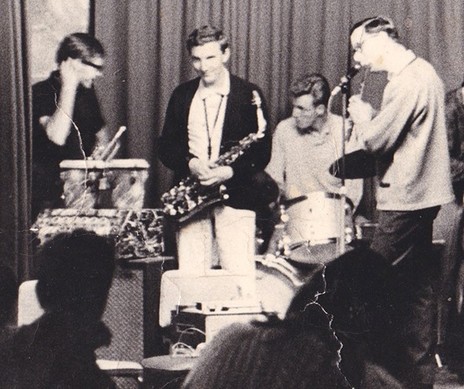
Tony Baker, with alto saxophone, at Alan Broadbent’s farewell concert at Embers Nightclub, Auckland, 1965. Kim Paterson on trumpet, Bernie Allen flute, Frank Gibson on drums. - Kim Paterson Collection
At about this time, saxophonist Tony Baker moved in, having previously become amazed, disconcerted, then enamoured of the 57a lifestyle while still wearing a school uniform. His first introduction – while a school boarder – had been by Dreamboat who, by then, was living elsewhere, and his friend Ken Fields. They had taken him in Ken’s car to the vineyard which supplied much of 57a’s refreshments, that of amiable host Miro Sumich of Oratia, whose product if nothing else was certainly cheap.
Miro’s plonk was stored in a row of oak kegs in his cellar. He would put a rubber hose into the first of these, suck on the hose and siphon the contents into the guests’ glasses. Then he would repeat the process with the second keg and the rest of the row. By the time they finished sampling, his guests had forgotten the taste of the first keg, so they would start again. After an afternoon of this lavish hospitality (though Tony did not yet drink, the others made up for him), they loaded 26 flagons of wine into the car and set off home, detouring through Waikumete cemetery where with much drunken hilarity they souvenired a number of white hoops.
Further on, they ran a red light and hit the back of another car. Two of the flagons shattered, spilling their contents over Tony’s school uniform. Eventually, after a clean-up failed and after much pleading and arguing by Tony, Ken deposited him at his boarding school at West Tamaki one-and-a half hours after curfew, smelling like a distillery. Terrified, Tony crept inside, where his school mates saved his bacon by rushing him into bed and covering him up to the neck under the bedclothes to conceal the tell-tale smell. The discovery of a number of white cemetery hoops in the school grounds the next morning remained for ever a mystery to the school authorities.
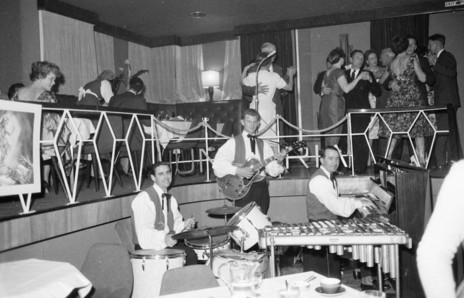
Lachie Jamieson drums at the Hungaria restaurant with, from left, Warwick Meehl and Des Windsor, 6 June 1960. - Rykenberg, Auckland Libraries Heritage Collections, 1269-B0749-16
Lachie Jamieson, with his frequent lapses of good taste. was hardly a role model, yet Tony adapted to the freewheeling atmosphere. He was unfazed by the succession of visitors and the parties which went on, sometimes for three days, and figured out – as had many others before him – that if all those wild oats had been sown in the unkempt garden, they would have fed a whole stable of horses indefinitely.
Brian Fagan, the bass player, also came to live at 57a, so there was now finally the nucleus of a band available to hire, whose music was mostly better than their behaviour in the opinion of those who hired them. One such grouping was a Dave Pell-style jazz quintet for which Tony found dance work at his former college.
Tony played baritone sax, Bernie Allen tenor sax, Bennie Gunn a trumpet he picked up at an auction, Brian Fagan bass, and Lachie was on drums. Tony was terrified that the band’s behaviour would fall far short of the strict standards demanded at his school, but in fact it was the limited appeal of California jazz to the young audience which finally put paid to that gig.
Tony’s wife-to-be Marie became a frequent visitor to 57a, but perhaps wisely decided that their married life would be better begun elsewhere.
10 – Yet Another Drummer Disturbs the Peace
The width and slope of the path from the street to 57a meant that no car could ever approach or be parked at the house, though the possibility was frequently debated. Alone of the residents, Choc could roar up and down on his Triumph motor bike, but Pem Sheppard had graphically demonstrated the fate of other wheeled vehicles by canning out of his wheel chair. So residents’ cars were always parked in the street above, with the consequent humping of gear and supplies up and down the path. As pianists, Choc and Bennie had the least problems, as electronic keyboards had not yet been invented, and going to a gig required only the lifting of a piano lid on the job.
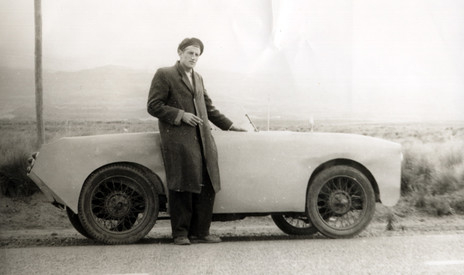
Bennie Gunn, jazz pianist, stops on the Desert Road beside a plywood car he built, on his way to join the Auckland scene in 1957 - Bennie Gunn Collection
One night, drummer Warren Rogan arrived at 57a so that Bennie could transport him to a gig in Takapuna in his car. Bennie’s car was a bone of contention with the traffic cops, being homemade from steam-bent plywood and lacking such luxuries as a hand-brake or windscreen wiper. As a two-seater with the safety precaution of one door only (on the passenger’s side, so that if a door were to fly open, the passenger would be pitched out rather than the driver), the only way to make room for Warren’s drums was to remove the rear deck lid altogether, and leave it at home. Once loaded, Bennie and Warren set off down Symonds Street to the vehicle ferry. They soon found a problem with the fuel flow which wasn’t serious while travelling downhill, but worsened by the time they got onto the ferry. Despite jerry-rigging the fuel system on the way over, when the ferry got to Devonport, the car wouldn’t start at all, and held up all the cars behind it. Goaded by an impatient crewman, Bennie lifted the engine cover off and dumped it on Warren’s drums in the back, and Warren splayed himself over the engine to drip petrol from a small can into the carburettor throat while Bennie slowly drove up the ramp to a flat spot where another fuel line could be fitted.
Finally, dishevelled and filthy, they arrived at the Takapuna dance one hour late, to be frozen by the glares of the dance-band, who to make matters worse, were dressed immaculately in dinner suits. The latecomers’ explanations were given little sympathy by Chips Healy, the bandleader who was a stickler for the conventions. After setting up the drums in record time, the disgruntled dancers were at last able to take the floor.
Relations with the leader improved only marginally during the evening, though the rest of the band started to see the funny side. When the hapless pair loaded Warren’s gear into the car after the gig, Chips was moved to only one comment after seeing Bennie’s car. “No wonder,” he said stiffly.
On the way back in the ferry, the memory of the stiff-necked band’s frozen expressions on their arrival became funnier and funnier, and Bennie and Warren roared with laughter. When they drove up and stopped outside 57a, they were still laughing uproariously in the crisp still night air at about 1.30 in the morning, as they unloaded Warren’s drums onto the deserted road. Warren was laughing so hard, he dropped his large Zildjian cymbal with a loud crash. It flipped on its edge, spun and wedged itself in the tram-rail, then rolled down Symonds Street still trapped, ringing against the steel rail with the most appallingly loud penetrating noise they’d ever heard.
As they frantically chased the runaway cymbal down the road, lights in many houses clicked on, and a few windows were opened by rudely awoken residents. Breathless, they finally caught the errant cymbal at Wellesley Street, where it had jumped the points and come to rest with a final deafening crash. Thoroughly abashed, Warren picked up his cymbal and the pair hid by a hedge until the lights in the houses had gone out before quietly picking their way back up the street. It was not a night of great music, but nevertheless a night they’d never forget.
11 – How a Half-G of Wine Got a Sick Car to the Mount
A highlight of the musical year was the annual holiday dance at Mount Maunganui. At one and usually two halls, dances would be held every night for two weeks to entertain the flocks of teenagers who converged on this popular spot each Christmas. Bands were housed in generally spartan conditions in houses or baches and sometimes in tents on the lawn, but always with the room for raucous parties late into the night after the gig.
In this year, Pem Sheppard was again band-leader, and Ione assembled all the gear and provisions into the Bradford van, which left no room for Pem. Therefore, Bennie Gunn offered to take Pem in his roomy but unreliable Commer station wagon, which by then had replaced his plywood sports car; it now lay in state in a backyard, having been hounded off the road by the Traffic Gestapo.
By the time Ione had taken the gear off to the Mount in the Bradford, the only gear left of Pem’s was his wheelchair and several cartons of grog, especially his flagons of cheap Lemora sweet sherry.
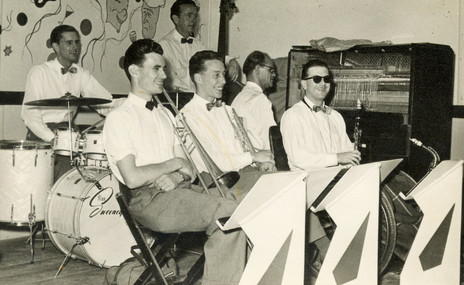
Pem Sheppard's band, Mt Maunganui, c 1955-56. Merv Thomas trombone, Lyn Christie trumpet, Lyall Laurent piano, Pem Sheppard clarinet. - Merv Thomas Collection
They set off from Auckland in the Commer, whose habit of falling out of top gear was solved by hooking a heavy weight over the gear lever. All was well until they passed Cambridge, when a steady knocking in the engine became audible at ever lower speeds. Bennie became seriously concerned, especially as they were due to play in the Mount that night, and pulled into a garage in Matamata where a seasoned mechanic was invited to listen to the engine. “How far do you think you’ll get on this, son?” he inquired. “Well, we’ll get to Mount Maunganui,” replied Bennie hopefully.
The mechanic looked incredulous, then almost doubled up with laughter. “Over the Kaimai’s? You’ve got to be kidding! The bearings are shot; they’ll have to be replaced, and I dunno what your crankshaft’s like!”
“Hell, how long will that take?”
“Well, we can order bearings from Hamilton today, they’ll arrive tomorrow, it’ll probably be finished the next day!” Bennie conferred with Pem. “What will we do now?” “Pass me a flagon of Lemora from the back, and I’ll show you!” said Pem.
Armed with the flagon, he spun off the top and passed it to Bennie.
“Have a drink, you’ll feel much happier; in fact, better have two!”
Pem then followed suit, then passed the flagon back. “Have another,” he suggested. “You’re really worried about that noise, aren’t you?”
“Well, of course. You heard what the mechanic said.”
“Sure,” replied Pem after another swig. “I reckon all you have to do is have another drink whenever you get worried, and the noise won’t be as bad. Why not drive slowly and try it out?”
Accordingly, by the time they got to the bottom of the Kaimai’s, the flagon was much lighter and the noise seemed only a muffled background knocking.
“There, told you so!” called Pem triumphantly., “Now, just take it easy and we’ll go all the way!”
As they tackled the steep hill, whenever the engine noise increased, they took another swig.
As they tackled the steep hill, whenever the noise increased, they took another swig, and the problem receded. At the summit, Bennie turned off the engine, and they coasted down the other side in blissful silence, and they celebrated by finishing off the flagon. They reached Tauranga before they needed the engine again, and then it was a relatively short hop to the Mount. By the time they reached the band house, the other members were waiting outside for them. “How did you know we were coming?” asked Bennie. “God! with the racket your car’s making we could hear you six blocks away! How did you put up with it?” Pem beamed. “Couldn’t hear a thing!” he said.
While the others spent their spare time during the day sleeping, drinking, and listening to records, Bennie spent his under the Commer pulling the bearings out. When he announced he had to get new bearings from Tauranga, Ione was helpful as ever.
“I’ve got an idea!” she said. “I’ve brought the dinghy down, we’ll simply row across the harbour – it’ll be good exercise and a good trip for Pem!”
As the road to Tauranga in those days was a good deal longer than it is now, it made good sense to save so much fuel. She drove the Bradford to the beach where, with Bennie, she unloaded the dinghy from the roof of the van, lifted in Pem, and stacked the wheelchair. Then Bennie pushed off, as Ione wielded the oars. Part way across the harbour, the idyllic conditions gave way to increasing cloud, and the wind started to whip up white caps on the water. Pem became alarmed at the pitching dinghy, especially when Bennie pushed a bailer into his hands, but Ione, rowing strongly, eventually reached the beach at Tauranga town centre, where Bennie shifted a by-now panic-stricken Pem into his wheel chair, and rushed him off the beach and over the road into the pub for some badly needed revival.
During Bennie’s long walk to the warehouse for the spare parts, Pem – back in the pub – had time to regain his courage for the return trip, when the waves had calmed. He swore never to go boating again.
The new bearings saved the day, but only just got the car back to Auckland. As the mechanic had predicted, the crankshaft had worn oval, and the engine had to be removed and completely reconditioned. Surprisingly, the wine had not improved the car at all, but had done wonders for the passengers.
12 – Dramatis Personae
Musicians, in alphabetical order, who lived at 57a and/or are part of these stories have their current activities listed as at original publication in mid-1993; updated if information available.
Allen, Bernie – tenor sax, clarinet, flute, arranger, teacher, professional musician and for some years a lecturer in music at Brisbane University
Baker, Tony – alto sax, clarinet, musical director, worked in TVNZ music department in Auckland; died in 1999
Christie, Lyn – bass player and trumpeter and doctor, left for the US in the early 1960s, practised medicine in New York many years, while also remaining a musician in the US; died in 2020
Dunningham, Neil – played trombone in radio bands and touring bands, played and taught music until his death in 1986
Gunn, Bennie – piano player, former manufacturer of amplifiers, computers, now full-time music in Auckland
Heine, Derek – clarinettist and band leader; left New Zealand in 1960s to live and work in music in Sacramento, California, returning to Auckland late 1980s where he obtained a government music sinecure but died soon after, in 1977
Ironsides, Dave (“Dreamboat”) – trumpeter and hard case who has lived overseas for many years. Currently living in Perth
Jamieson, Lachie – drummer who brought modern jazz with him when deported back from the US. Fled to Sydney in 1968 where he played until his death in 1993
Leemon, Val (“Choc”) – piano player and teacher fulltime since 1960s and still playing full time in Auckland
Martin, Tarz – bass player in Auckland until recent years, now retired
Robson, Pete – since leaving 57A has resided in London, practising law rather than the saxophone
Rogan, Warren – no longer plays drums but keenly interested in jazz; has a painting business in San Francisco
Rosoman, Art – expat Canadian, in New Zealand from 1939-1949. Tenor sax, piano, trumpet, band leader and colourful character. Returned to Canada
Saunders, Loma – post-war vocalist who worked at Stebbing’s by day and sang at the Trocadero at night. Recorded ‘Little Miss Muffett’ for Stebbing, and ‘Accidents Will Happen’ for Zodiac, both in 1951. Destiny and whereabouts unknown
Sheppard, Pem – played alto sax and clarinet as radio band leader, dance bands and taught music. Died in 1964 aged 37
Sheppard, Ione – Pem’s wife and minder who went on to become a trumpeter herself. Long-time resident of Sydney where she married a pianist and became a bus driver. Now retired
Smith, Maurie – part-time baritone sax player, retired, living in Auckland
Sussex, Harold – landlord of 57a, then in a rest home; died about 1982, aged 86
Taggart, Bob – alto sax and clarinet player with a unique style. Retired taxi driver, part-time music teacher
Thomas, Merv – trombonist, band leader, musical director, fully engaged today in video production and music in Auckland
Acknowledgements: Grateful thanks to the recollections and long-term memories of Val Leemon, Bob Taggart, Joy Crees, Merv Thomas, Tony Baker, Dale Alderton, Johnny McWhirter, George Sussex, and those others who have contributed or verified incidents in this book.
This is the first edition of this publication (in case there should ever be a second!) – August 1993.
Republished with the permission of Bennie Gunn © Copyright Bennie Gunn